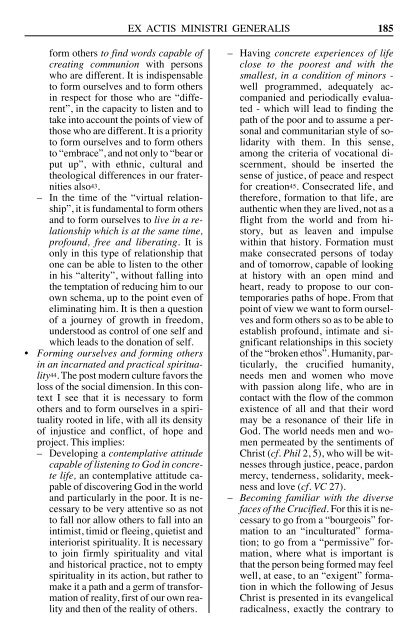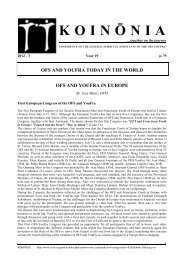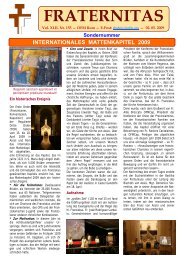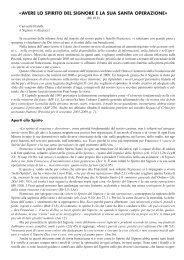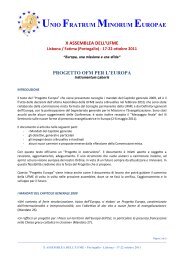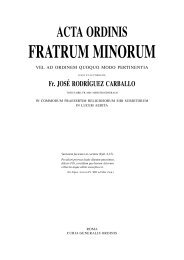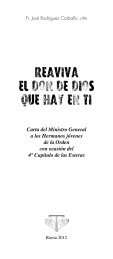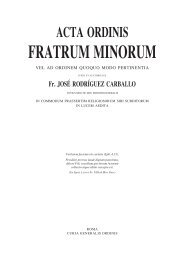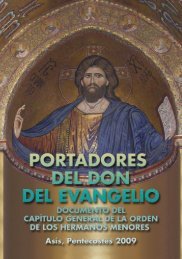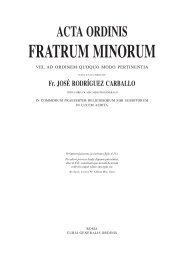Create successful ePaper yourself
Turn your PDF publications into a flip-book with our unique Google optimized e-Paper software.
EX ACTIS MINISTRI GENERALIS<br />
185<br />
form others to find words capable of<br />
creating communion with persons<br />
who are different. It is indispensable<br />
to form ourselves and to form others<br />
in respect for those who are “different”,<br />
in the capacity to listen and to<br />
take into account the points of view of<br />
those who are different. It is a priority<br />
to form ourselves and to form others<br />
to “embrace”, and not only to “bear or<br />
put up”, with ethnic, cultural and<br />
theological differences in our fraternities<br />
also43.<br />
– In the time of the “virtual relationship”,<br />
it is fundamental to form others<br />
and to form ourselves to live in a relationship<br />
which is at the same time,<br />
profound, free and liberating. It is<br />
only in this type of relationship that<br />
one can be able to listen to the other<br />
in his “alterity”, without falling into<br />
the temptation of reducing him to our<br />
own schema, up to the point even of<br />
eliminating him. It is then a question<br />
of a journey of growth in freedom,<br />
understood as control of one self and<br />
which leads to the donation of self.<br />
• Forming ourselves and forming others<br />
in an incarnated and practical spirituality44.<br />
The post modern culture favors the<br />
loss of the social dimension. In this context<br />
I see that it is necessary to form<br />
others and to form ourselves in a spirituality<br />
rooted in life, with all its density<br />
of injustice and conflict, of hope and<br />
project. This implies:<br />
– Developing a contemplative attitude<br />
capable of listening to God in concrete<br />
life, an contemplative attitude capable<br />
of discovering God in the world<br />
and particularly in the poor. It is necessary<br />
to be very attentive so as not<br />
to fall nor allow others to fall into an<br />
intimist, timid or fleeing, quietist and<br />
interiorist spirituality. It is necessary<br />
to join firmly spirituality and vital<br />
and historical practice, not to empty<br />
spirituality in its action, but rather to<br />
make it a path and a germ of transformation<br />
of reality, first of our own reality<br />
and then of the reality of others.<br />
– Having concrete experiences of life<br />
close to the poorest and with the<br />
smallest, in a condition of minors -<br />
well programmed, adequately accompanied<br />
and periodically evaluated<br />
- which will lead to finding the<br />
path of the poor and to assume a personal<br />
and communitarian style of solidarity<br />
with them. In this sense,<br />
among the criteria of vocational discernment,<br />
should be inserted the<br />
sense of justice, of peace and respect<br />
for creation45. Consecrated life, and<br />
therefore, formation to that life, are<br />
authentic when they are lived, not as a<br />
flight from the world and from history,<br />
but as leaven and impulse<br />
within that history. Formation must<br />
make consecrated persons of today<br />
and of tomorrow, capable of looking<br />
at history with an open mind and<br />
heart, ready to propose to our contemporaries<br />
paths of hope. From that<br />
point of view we want to form ourselves<br />
and form others so as to be able to<br />
establish profound, intimate and significant<br />
relationships in this society<br />
of the “broken ethos”. Humanity, particularly,<br />
the crucified humanity,<br />
needs men and women who move<br />
with passion along life, who are in<br />
contact with the flow of the common<br />
existence of all and that their word<br />
may be a resonance of their life in<br />
God. The world needs men and women<br />
permeated by the sentiments of<br />
Christ (cf. Phil 2, 5), who will be witnesses<br />
through justice, peace, pardon<br />
mercy, tenderness, solidarity, meekness<br />
and love (cf. VC 27).<br />
– Becoming familiar with the diverse<br />
faces of the Crucified. For this it is necessary<br />
to go from a “bourgeois” formation<br />
to an “inculturated” formation;<br />
to go from a “permissive” formation,<br />
where what is important is<br />
that the person being formed may feel<br />
well, at ease, to an “exigent” formation<br />
in which the following of Jesus<br />
Christ is presented in its evangelical<br />
radicalness, exactly the contrary to


